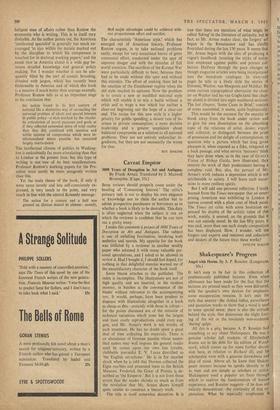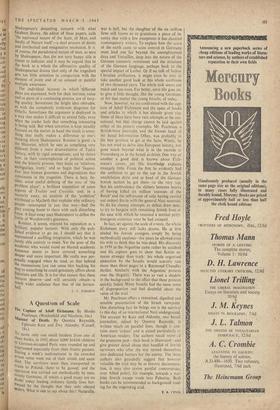Shakespeare's Progress IT isn't easy to be fair to this
collection of posthumously published lectures. Even when allowance has been made for the fact that the lectures are printed much as they were delivered, with the speaker's own devices for emphasis, some exasperation remains. It isn't only the style that annoys--the clotted italics, parentheses and quotation marks to show that a word is used in some special sense; there is also the attitude behind the style, that determines the slight forc- ing of the wit or the resolutely non-academic 'daring' quips. All this is a pity, because A. P. Rossiter had something to say about Shakespeare. He was 3 genuine scholar (all students of Elizabethan drama are in his debt for his edition of Wood- stock, which comes up for some further discus- sion here, in relation to Richard II), and his scholarship went with a genuine shrewdness and play of mind. Above all, he knew that Shakes- peare matters because he speaks directly to 119 as men and not simply as scholars or critics. Shakespeare used a popular art form through which to explore the fundamentals of human experience, and Rossiter suggests—if he does not entirely demonstrate—the continuity of that ex' i ploration. What he especially emphasises is Shakespeare's deepening concern with what Graham Storey, the editor of these papers, calls the equivocal nature of the State, of Man, and finally of Nature itself'—a dual process of doubt and intellectual and imaginative, resolution. It is of course, the paradoxical nature of man, as seen by Shakespeare, that the not very happy title is meant to indicate; and it may be argued that in the book as a whole the affirmative quality of Shakespearian drama (not only of the tragedies) gets too little attention in comparison with the element of irony and of an amused or painful multiple awareness.
The individual lectures in which 'different Plays are examined, both for their intrinsic value and as parts of a continuing process, are of vary- ing quality. Sometimes the bright idea obtrudes, as with the completely irrelevant diagrams for Othello. Sometimes the argument is deployed 'n a way that makes it difficult to attend fully, even When the reader feels that something interesting Is being said. But when attention is kept steadily focused on the matter in hand the result is some- thing that really makes a difference to one's thinking about Shakespeare. Rossiter is good cn the Histories, which he sees as something very different from a mere dramatisation of Tudor history, with its rigid conceptions.; and he shows how, in their contemplation of political action and the historic process, they insist on 'relatives, ambiguities, irony,' and so begin that 'inquisi- tion' into human greatness and degradation that culminates in the tragedies. There is here, be- sides, some useful defining of the tone of 'the Problem plays'; a brilliant exposition of some aspects of Troilus and Cressida; and, in a masterly essay, an analysis of the 'ambition' attributed to Macbeth that explains why ordinary People—untempted in just that way—find the Play coming home to them with such disturbing force. A final essay uses Shakespeare to define the limits of Wordsworth's greatness.
Rossiter, it seems, enjoyed his reputation as a brilliant, popular lecturer. With only the pub- lished evidence to go on, I should say that it represented a stalfding temptation, which he was ,rarely able entirely to resist. Yet the pose of the academic who would stand no blasted academic nonsense seems to have covered something deeper and more important. He really was per- .sonally engaged when he read, so that behind the mannerisms you can sense him hacking his Way to something he could genuinely affirm about literature and life. It is for that reason that these lectures deserve—and will certainly obtain—a much wider audience than that of the lecture- hall.
L. C. KNIGHTS







































 Previous page
Previous page